-
 Bitcoin
Bitcoin $82,099.5826
-1.34% -
 Ethereum
Ethereum $1,817.9545
-1.07% -
 Tether USDt
Tether USDt $0.9999
0.02% -
 XRP
XRP $2.0815
-3.96% -
 BNB
BNB $595.8647
-1.53% -
 Solana
Solana $124.0327
-0.92% -
 USDC
USDC $1.0000
0.01% -
 Dogecoin
Dogecoin $0.1634
-3.94% -
 Cardano
Cardano $0.6445
-4.65% -
 TRON
TRON $0.2336
1.34% -
 Toncoin
Toncoin $3.9381
2.61% -
 Chainlink
Chainlink $13.2201
-3.75% -
 UNUS SED LEO
UNUS SED LEO $9.0947
-5.84% -
 Stellar
Stellar $0.2646
-1.90% -
 Avalanche
Avalanche $18.6234
-3.91% -
 Shiba Inu
Shiba Inu $0.0...01214
-3.88% -
 Sui
Sui $2.2126
-6.78% -
 Hedera
Hedera $0.1604
-6.61% -
 Polkadot
Polkadot $4.0237
-1.97% -
 Litecoin
Litecoin $82.1655
-4.48% -
 MANTRA
MANTRA $6.2849
-1.13% -
 Bitcoin Cash
Bitcoin Cash $298.8203
-2.66% -
 Dai
Dai $1.0000
0.02% -
 Bitget Token
Bitget Token $4.4293
-4.57% -
 Ethena USDe
Ethena USDe $1.0000
0.01% -
 Pi
Pi $0.6976
-9.77% -
 Hyperliquid
Hyperliquid $12.5853
-0.74% -
 Monero
Monero $215.4717
-0.22% -
 Uniswap
Uniswap $5.8825
-1.85% -
 Aptos
Aptos $5.1958
-2.29%
How to check the transaction status when transferring money in Ethereum wallet?
Track your Ethereum transaction status via your wallet's interface, block explorers like Etherscan, or third-party trackers. Pending transactions await confirmation; confirmed transactions are included in a block; failed transactions indicate issues like insufficient funds or incorrect addresses.
Mar 24, 2025 at 08:56 pm
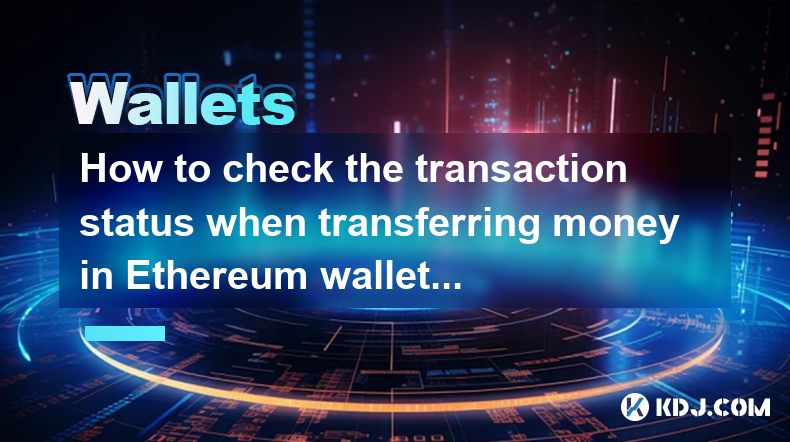
How to Check the Transaction Status When Transferring Money in an Ethereum Wallet?
Transferring Ether (ETH) or ERC-20 tokens on the Ethereum network involves several steps, and monitoring the transaction's progress is crucial. The speed and confirmation time vary significantly depending on network congestion and the gas fee you set. Understanding how to track your transaction is therefore essential to avoid unnecessary worry and ensure your funds arrive safely.
Understanding Ethereum Transactions
Unlike traditional banking systems, Ethereum transactions aren't instantly processed. They're included in blocks, which are added to the blockchain sequentially by miners. This process takes time, and the confirmation time depends heavily on the network's current activity. A higher gas fee generally leads to faster processing, as miners prioritize transactions with higher fees.
Methods to Check Transaction Status
There are several ways to track your Ethereum transaction status, each offering different levels of detail.
- Using Your Wallet's Interface: Most Ethereum wallets (like MetaMask, Trust Wallet, Ledger Live) provide built-in transaction trackers. After initiating a transfer, the wallet typically displays the transaction hash (a unique identifier). Clicking on this hash will show the transaction's status – pending, confirmed, or failed. The interface usually displays the transaction's progress in real-time.
- Using Block Explorers: Block explorers are websites that provide a detailed view of the Ethereum blockchain. Popular options include Etherscan, Blockscout, and others. You can enter your transaction hash into these explorers to see its current status, including the block it's been included in (if confirmed), the gas used, and the transaction fee. These explorers offer a comprehensive overview, often surpassing the detail provided by your wallet.
- Using Third-Party Transaction Trackers: Some third-party services specialize in tracking cryptocurrency transactions. These platforms aggregate data from multiple block explorers, offering a convenient way to monitor your transactions across different blockchains, not just Ethereum. However, always verify the legitimacy of any third-party service before using it.
Interpreting Transaction Status
Understanding the different transaction statuses is vital.
- Pending: This indicates your transaction is awaiting inclusion in a block. It's still unconfirmed, and the funds haven't yet reached the recipient. This phase's duration depends on network congestion and the gas price.
- Confirmed: Once your transaction is included in a block, it's considered confirmed. The number of confirmations required for security varies, but generally, six confirmations are considered sufficient. The more confirmations, the lower the probability of the transaction being reversed (though this is extremely rare on Ethereum).
- Failed: A failed transaction indicates that something went wrong. Reasons include insufficient funds, an incorrect recipient address, or a gas fee too low for the network's current conditions. The details of the failure are usually provided by your wallet or the block explorer.
Troubleshooting Transaction Issues
If your transaction remains pending for an extended period, several factors could be at play.
- Network Congestion: High network activity can significantly delay transaction confirmations. This is common during periods of high trading volume or when new projects launch on Ethereum.
- Insufficient Gas Fee: If your gas fee is too low, miners might not prioritize your transaction, leading to delays or failure. Increasing the gas fee often resolves this.
- Incorrect Recipient Address: Double-check the recipient address to ensure it's correct. Sending funds to the wrong address results in irreversible loss of funds.
- Wallet Issues: Problems with your wallet software can also interfere with transactions. Try restarting your wallet or updating it to the latest version.
Advanced Techniques
For more control over transaction speed, you can adjust the gas price manually. Higher gas prices increase the likelihood of faster confirmation, but they also increase transaction fees. Many wallets allow you to choose between "standard," "fast," and "fastest" gas options.
Specific Wallet Instructions
The exact steps for checking transaction status vary slightly depending on the wallet you use. Consult your wallet's documentation or support resources for detailed instructions specific to your chosen platform.
Common Questions and Answers
Q: My Ethereum transaction is pending for a long time. What should I do?
A: First, check the network congestion. If the network is congested, you might need to wait or increase your gas fee. If the network is not congested, check your wallet and the transaction details on a block explorer for any error messages.
Q: What does "gas" mean in an Ethereum transaction?
A: Gas is the computational cost required to execute a transaction on the Ethereum network. It's paid in ETH and determines the transaction fee.
Q: How many confirmations are needed for a secure Ethereum transaction?
A: While one confirmation is generally sufficient for many, six confirmations are typically considered secure. The higher the number of confirmations, the lower the risk of reversal.
Q: My Ethereum transaction failed. What are the possible reasons?
A: Possible reasons include insufficient funds, an incorrect recipient address, or an insufficient gas fee. Check your wallet and the transaction details on a block explorer for specific error messages.
Q: Can I cancel a pending Ethereum transaction?
A: Generally, you cannot cancel a pending Ethereum transaction. Once initiated, it enters the network. However, some wallets might offer a method to replace a transaction with a new one with a higher gas fee, effectively overriding the original.
Q: Where can I find my transaction hash?
A: Your transaction hash is usually displayed in your wallet after you initiate a transaction. It's a unique alphanumeric identifier that allows you to track the transaction on block explorers.
Disclaimer:info@kdj.com
The information provided is not trading advice. kdj.com does not assume any responsibility for any investments made based on the information provided in this article. Cryptocurrencies are highly volatile and it is highly recommended that you invest with caution after thorough research!
If you believe that the content used on this website infringes your copyright, please contact us immediately (info@kdj.com) and we will delete it promptly.
- Scottish law changes coming into effect in April - including car tax and living wage changes
- 2025-03-31 20:55:12
- Green light to demolish Black Country leisure centre for £24m replacement
- 2025-03-31 20:55:12
- Bitcoin (BTCUSD) Price Dips Below $82K as Market Mood Remains Subdued This Week
- 2025-03-31 20:50:12
- Bitcoin (BTC) Price Prediction: Will BTC Hold the $80K Support Level?
- 2025-03-31 20:50:12
- Organizer: Jerry, ChainCatcher
- 2025-03-31 20:45:13
- The House of Doge, a new Dogecoin Foundation partner, announced they are holding a reserve of 10 million DOGE
- 2025-03-31 20:45:13
Related knowledge

How to easily generate a Bitcoin payment address
Mar 29,2025 at 10:49am
Generating a Bitcoin payment address might seem daunting, but it's actually quite straightforward. This process is crucial for receiving Bitcoin, as each transaction requires a unique address. Understanding how this works is fundamental to using Bitcoin effectively. This guide will walk you through the simple steps, regardless of your technical experti...
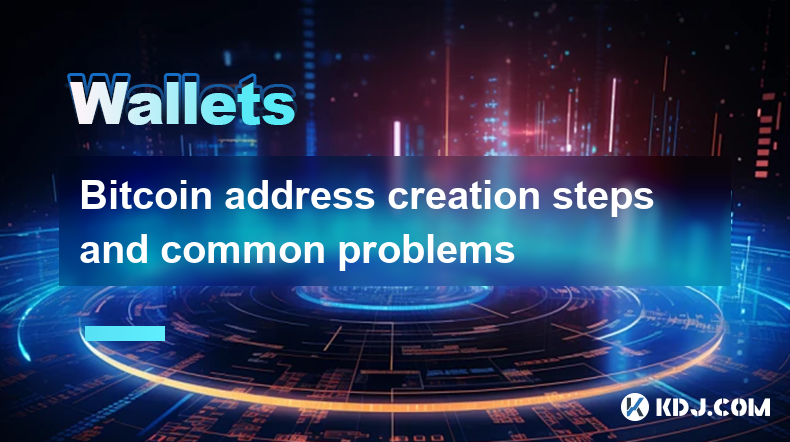
Bitcoin address creation steps and common problems
Mar 30,2025 at 06:07am
Understanding Bitcoin AddressesA Bitcoin address is a unique identifier, similar to a bank account number, used to receive Bitcoin. It's a string of alphanumeric characters generated from a public key, derived from your private key. Understanding the distinction between public and private keys is crucial for Bitcoin security. Your private key should be...
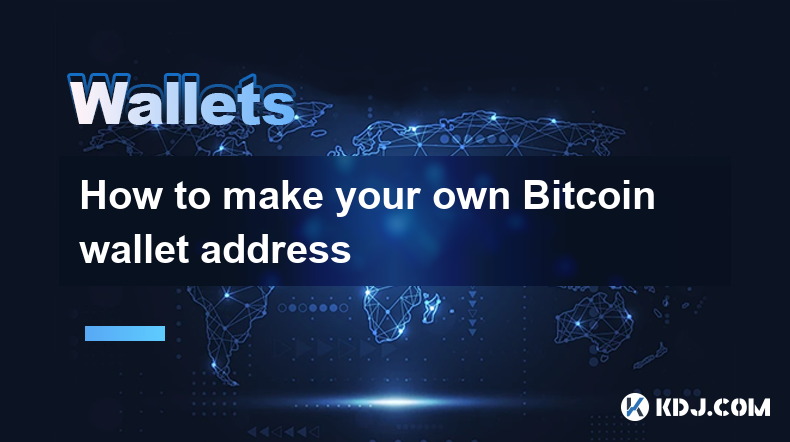
How to make your own Bitcoin wallet address
Mar 29,2025 at 08:42pm
Creating your own Bitcoin wallet address is crucial for securing and managing your Bitcoin holdings. It allows you to independently receive and send Bitcoin without relying on third-party services. This process involves understanding the different types of wallets and choosing the one that best suits your needs and technical expertise. Incorrectly gene...
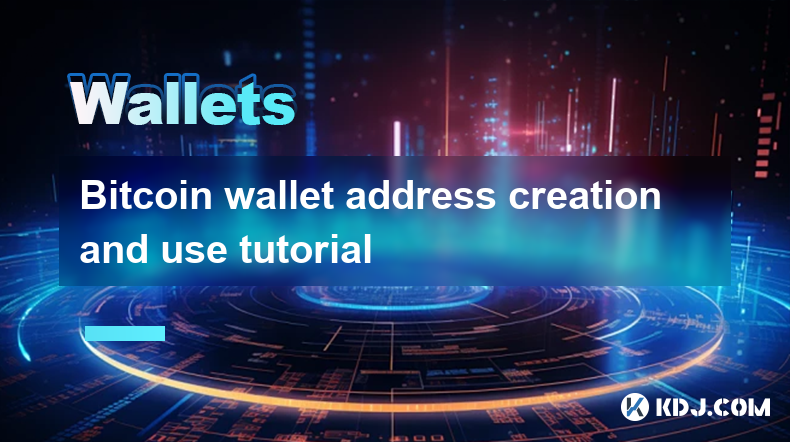
Bitcoin wallet address creation and use tutorial
Mar 29,2025 at 10:14pm
Understanding Bitcoin Wallet AddressesA Bitcoin wallet doesn't store Bitcoin in the way a traditional bank account does. Instead, it stores private keys, which are cryptographic secrets allowing you to access and spend your Bitcoin. Your Bitcoin address, on the other hand, is a public identifier, like an email address, that others can use to send you B...

Bitcoin address generation and secure storage guide
Mar 30,2025 at 08:07am
Understanding Bitcoin AddressesA Bitcoin address is essentially your public key, a string of alphanumeric characters used to receive Bitcoin. It's analogous to your bank account number. Unlike your private key, which is crucial for spending your Bitcoin, your address can be shared publicly without compromising your funds. Generating a new address is sim...
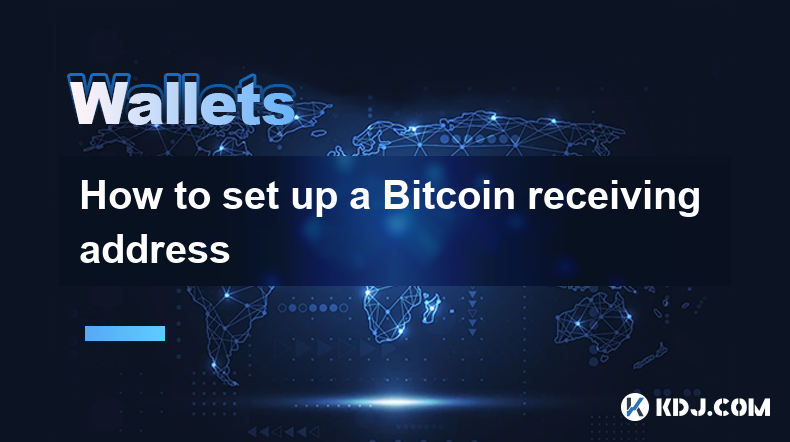
How to set up a Bitcoin receiving address
Mar 30,2025 at 06:14pm
Understanding Bitcoin Receiving AddressesA Bitcoin receiving address is essentially your unique identifier on the Bitcoin network. It's a string of alphanumeric characters that allows others to send Bitcoin to you. Think of it like your bank account number, but specifically for Bitcoin. You need a receiving address to receive Bitcoin. Crucially, you ca...

How to easily generate a Bitcoin payment address
Mar 29,2025 at 10:49am
Generating a Bitcoin payment address might seem daunting, but it's actually quite straightforward. This process is crucial for receiving Bitcoin, as each transaction requires a unique address. Understanding how this works is fundamental to using Bitcoin effectively. This guide will walk you through the simple steps, regardless of your technical experti...

Bitcoin address creation steps and common problems
Mar 30,2025 at 06:07am
Understanding Bitcoin AddressesA Bitcoin address is a unique identifier, similar to a bank account number, used to receive Bitcoin. It's a string of alphanumeric characters generated from a public key, derived from your private key. Understanding the distinction between public and private keys is crucial for Bitcoin security. Your private key should be...

How to make your own Bitcoin wallet address
Mar 29,2025 at 08:42pm
Creating your own Bitcoin wallet address is crucial for securing and managing your Bitcoin holdings. It allows you to independently receive and send Bitcoin without relying on third-party services. This process involves understanding the different types of wallets and choosing the one that best suits your needs and technical expertise. Incorrectly gene...

Bitcoin wallet address creation and use tutorial
Mar 29,2025 at 10:14pm
Understanding Bitcoin Wallet AddressesA Bitcoin wallet doesn't store Bitcoin in the way a traditional bank account does. Instead, it stores private keys, which are cryptographic secrets allowing you to access and spend your Bitcoin. Your Bitcoin address, on the other hand, is a public identifier, like an email address, that others can use to send you B...

Bitcoin address generation and secure storage guide
Mar 30,2025 at 08:07am
Understanding Bitcoin AddressesA Bitcoin address is essentially your public key, a string of alphanumeric characters used to receive Bitcoin. It's analogous to your bank account number. Unlike your private key, which is crucial for spending your Bitcoin, your address can be shared publicly without compromising your funds. Generating a new address is sim...

How to set up a Bitcoin receiving address
Mar 30,2025 at 06:14pm
Understanding Bitcoin Receiving AddressesA Bitcoin receiving address is essentially your unique identifier on the Bitcoin network. It's a string of alphanumeric characters that allows others to send Bitcoin to you. Think of it like your bank account number, but specifically for Bitcoin. You need a receiving address to receive Bitcoin. Crucially, you ca...
See all articles






















































































